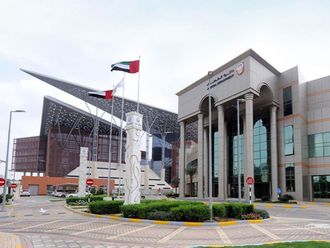Dubai: The public’s help in thwarting beggars in the emirate has led to a substantial increase in the number of arrests made by Dubai Police, officials said on Tuesday.
More than 1,400 beggars were arrested last year after the Criminal Investigation Department launched its 800 CID (800-243) hotline, almost a 58 per cent increase compared with 814 arrested the year before.
“The public’s help is vital. We’re attributing the huge jump in the statistics to the reports made by the public via the hotline,” Colonel Mohammad Rashid Bin Surai, director of the Tourism Security Department, said ahead of a rigorous campaign police are launching to thwart beggars during Ramadan. Col Surai said beggars find the month to be a profitable time to ask for alms.
“Of the total number of beggars we arrested last year, 312 were during Ramadan alone,” he said, adding that a special task force was being set up to find and arrest beggars during Ramadan.
“A task force of 21 officers has been assigned to handle this matter,” he said. “They will be patrolling the city while receiving tip-offs from the public in order to curb begging in the city. Security will also be tightened around places where we find begging to be most prevalent.”
He said that the task force can be directly reached at 052 210 6969.
Col Surai said that an awareness campaign will run to educate the public on the social and safety risks posed by begging. “Beggars are finding newer ways to elicit people’s sympathy,” he said. “Social media is also being used by them which makes it harder for us to track them. They may swindle people by asking for money for simple things like schoolbooks for their children, and spectacles. People should be wary of falling for such ruses and report to us through our hotline immediately.”
He added that if people were interested in giving alms during the month of Ramadan, they should donate to one of the charity organisations recognised by authorities. “There are a number of organisations in the country that handle the distribution of donations to the poor. Through those organisations, we can be sure the money is being used for good and pious causes. We cannot say the same for beggars.”
Col Surai said that legal repercussions differ for beggars found to be lying about their medical or financial condition. “The law applies different charges for beggars found to be healthy and those who suffer from financial difficulty or health problems,” he said, adding that if a person is found to be in sincere need of help, police direct the person to a charity organisation.
“In such incidences, the case remains open until we can throughly verify the person’s background,” he said, “if we find out they’ve been lying about their condition, they will be formally charged and deported.”
More than 1,100 of the 1,405 people arrested on begging charges last year were men. Since 2009, Dubai Police have arrested 5,559 people for begging, of whom 4,486 were men and 1,073 were women.
An official from the General Directorate of Residency and Foreigners Affairs (GDRFA) said that the department looks into how a beggar entered the country, and action against tourist companies and individuals is taken for sponsoring them.
“A fine starting at Dh5,000 [for first instances] is given to the individual who sponsored the beggar’s visit visa,” he said, adding that tourist companies face a larger fine which diminishes the quota of people they are entitled to bring into the country. “If a tourist company is found to be repeating the offence, their trade licence is revoked.”












